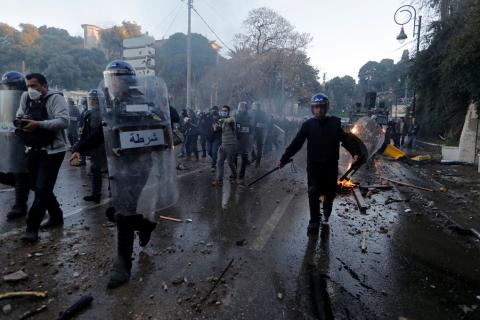Advertisement
Protests resume in Algeria on day Bouteflika due to submit election bid
ALGIERS (Reuters) - Anti-government protests resumed in Algeria on Sunday as tens of thousands gathered in the capital and other towns to demand Algerian President Abdelaziz Bouteflika drop plans to stand for a fifth term, witnesses and residents said.
In a rare wave of public dissent, Algerians have been taking to the streets since rallies calling on him to step down began 10 days ago. Bouteflika, 82, in shaky health for years, was due to submit his official election papers at the Constitutional Council in Algiers on Sunday, the deadline for candidates.
He need not do so in person, the state news agency APS said. Bouteflika, rarely seen in public since he suffered a stroke in 2013, was at the weekend still in Switzerland for unspecified medical checks, according to Swiss media.
Algeria's weak and divided opposition and civic groups have called for more protests should Bouteflika, who has been in power for 20 years, confirm his re-election bid.
Opponents say that Bouteflika is no longer fit to lead, citing his poor health and what they call chronic corruption and a lack of economic reforms to tackle unemployment that exceeds 25 percent among people under the age of 30.
But analysts say protesters lack leadership and organisation in a country still dominated by veterans, like Bouteflika, of the 1954-62 independence war against France.
Thousands of students gathered at several university faculties, one of them near the Constitutional Council where presidential candidates file their papers, chanting: "No to a fifth term!" or "A free and democratic Algeria!"
There was heavy security around the Constitutional Council, and police prevented restive students from leaving the campus nearby, keeping the main gates shut. But some students were seen later marching outside.
"We will not stop until we get rid of this system," said Aicha, a 23-year-old student. Many university graduates face joblessness in an economy dominated by the state.
MORE PROTESTS AROUND THE COUNTRY
According to witnesses and local television footage, protesters also turned out in their thousands in other cities around the major oil- and gas-producing country, such as Oran, Batna, Blida, Skikda and Bouira.
The first candidate to submit his papers was Ali Ghediri, a retired general who is challenging the elite made up of military, ruling FLN party and business leaders. "I tell the people a new dawn has started," he told reporters.
By midday, six candidates had formally registered. There was no sign of Bouteflika's bid.
Bouteflika changed his campaign manager on Saturday, state media said. He has not addressed the protests against him - the biggest since the 2011 uprisings that ousted long entrenched elites in a number of Arab countries, though not in Algeria.
Friday saw the largest turnout to date in the protest wave, with tens of thousands in the streets. A total of 183 people were injured and one person died of a heart attack, APS said.
Many Algerians avoided public political activity for years, for fear of trouble from the pervasive security services or out of disillusionment with the lack of change in the leadership.
After a decade-long Islamist insurgency that Bouteflika stamped out early in his rule, Algerians have often tolerated a political system with little space for dissent as a price to pay for relative peace and stability.
But disaffection has simmered with over one in four young people unemployed in a country that remains heavily reliant on oil and gas exports, despite numerous official promises of economic diversification over many years.
(Reporting by Lamine Chikhi, Hamid Ould Ahmed and Ulf Laessing; Writing by Ulf Laessing; Editing by Mark Heinrich)



















Add new comment